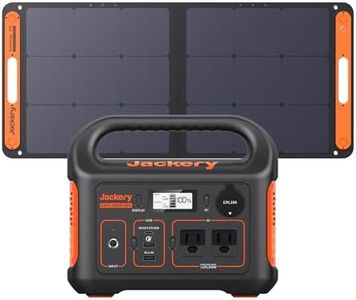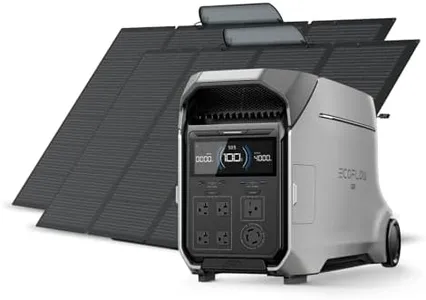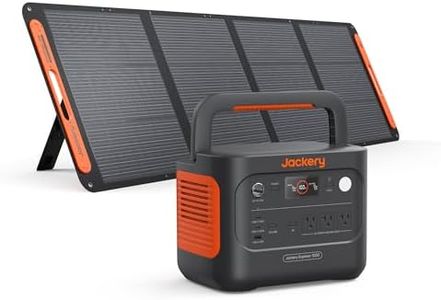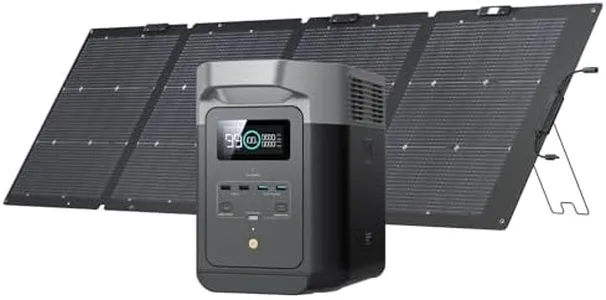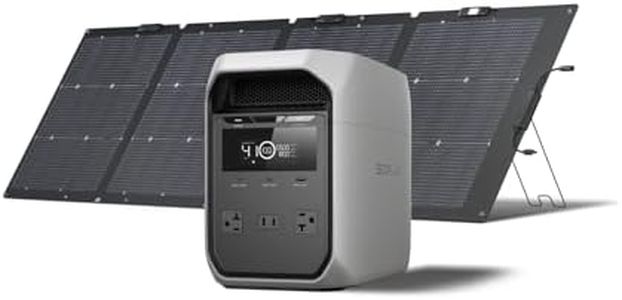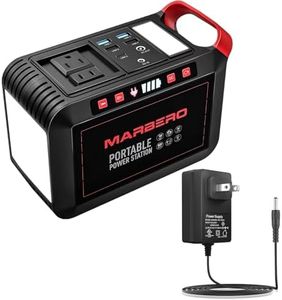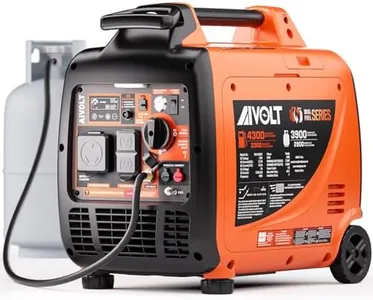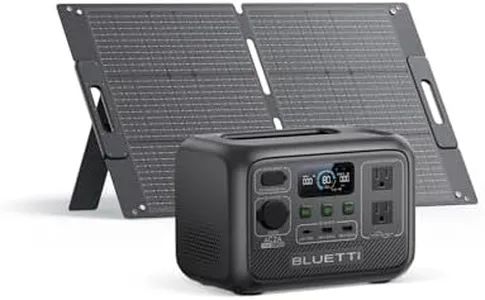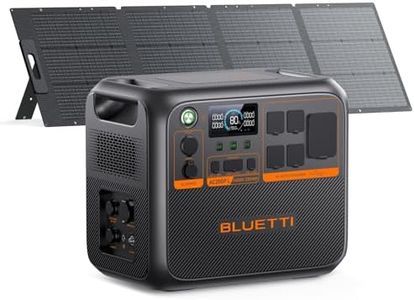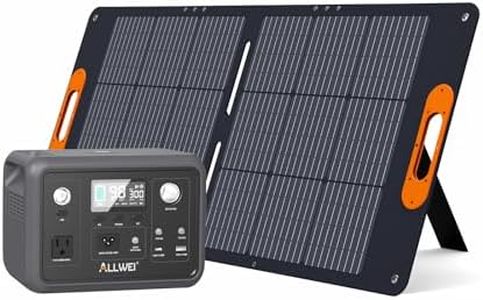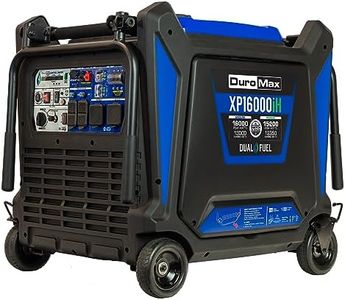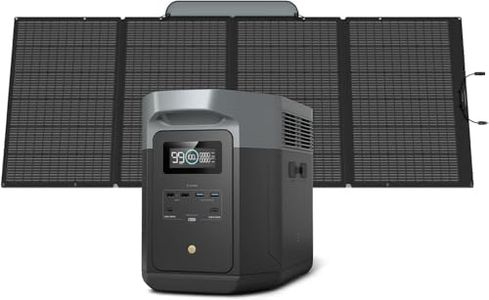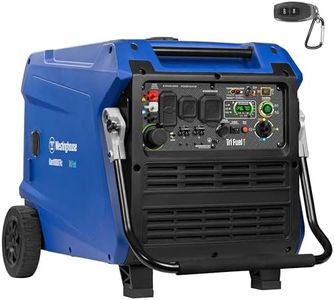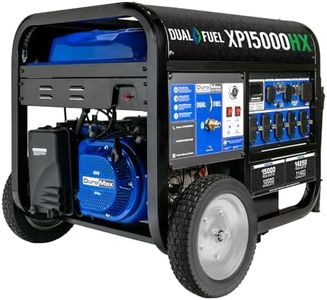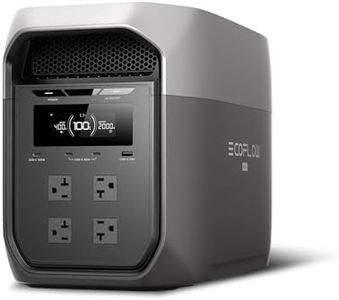10 Best Camping Portable Generator 2026 in the United States
Our technology thoroughly searches through the online shopping world, reviewing hundreds of sites. We then process and analyze this information, updating in real-time to bring you the latest top-rated products. This way, you always get the best and most current options available.

Our Top Picks
Winner
Jackery Solar Generator 300, 293Wh Backup Lithium Battery with 1XSolar Panel SolarSaga 100W, 110V/300W Pure Sine Wave AC Outlet for RV Outdoors Camping Travel Blackout
Most important from
11052 reviews
The Jackery Solar Generator 300 is a lightweight and portable power solution ideal for camping, outdoor adventures, and emergency backup. It offers a steady 300-watt output with a 293Wh lithium battery, which is sufficient to power small devices like phones, laptops, cameras, and even some small appliances. Its key advantage is the ability to recharge quickly—up to 80% in 2 hours—using a wall outlet, car charger, USB-C port, or the separate SolarSaga 100W solar panel, making it versatile for off-grid use without gasoline or fumes. The generator is quiet and maintenance-free, which is great for outdoor settings where noise and smell can be issues.
It includes multiple outlets: two AC sockets, USB-C PD, USB-A, and a DC car port, enabling charging of up to six devices simultaneously. Safety is supported by pure sine wave output, ensuring stable power for sensitive electronics. Its 300W limit means it won't support larger equipment or high-power tools, so it’s best suited for light to moderate power needs. Also, note that the solar panel and generator are shipped separately, which might be inconvenient. At just over 7 pounds and compact size, it’s easy to carry, making it a solid choice for campers and travelers wanting clean, quiet power without the bulk or noise of gas generators.
Most important from
11052 reviews
EF ECOFLOW Solar Generator 4096Wh DELTA Pro 3 with 2X400W Portable Panels, 120/240V 4000W AC Output, Solar Generator for Home Use, Camping Accessories, Emergencies, Power Outages, RVs
Most important from
520 reviews
The EF ECOFLOW Solar Generator DELTA Pro 3 is a robust option for those seeking a reliable power source for camping, home use, or emergencies. With a substantial 4000W AC output (extendable up to 6000W with X-Boost), it can power most essential appliances, making it versatile for various scenarios, from home backups to RV adventures. One standout feature is its remarkable 4096Wh battery capacity, extendable to 48kWh with additional components, offering potentially days of power without the need for refueling.
The generator supports multiple charging methods, including solar panels and AC outlets, enhancing its adaptability. It's particularly beneficial for renewable energy enthusiasts, as it comes with two 400W solar panels, promoting sustainable power use.
In terms of portability, the DELTA Pro 3's 115-pound weight is on the heavier side for a 'portable' device, which might be challenging for solo campers to transport. However, its handle design aids mobility to some extent. This generator features a swift switch-over capability with a 10 ms response, providing near-instant backup during power disruptions, which is vital for uninterrupted operation of critical devices.
Another commendable aspect is its noise level, operating at a quiet 30 dB, which is quite soothing compared to traditional generators, making it suitable for both indoor and outdoor settings without causing disturbances. The safety features, including LFP cells and IP65-rated battery pack technology, extend the lifespan and reliability of the device, offering peace of mind with a 5-year warranty.
Though it ranks moderately in the outdoor generator category, with a 4.5-star rating from users, potential buyers should consider its size and weight against their specific needs in portability and ease of transport. This model is ideal for those who can accommodate its heft and wish to leverage its high power output and eco-friendly solar capabilities.
Most important from
520 reviews
Jackery Solar Generator 1000 v2 with 200W Solar Panel,1070Wh Portable Power Station LiFePO4 Battery,1500W AC/100W USB-C Output, 1Hr Fast Charge for Outdoor,Off-Grid Living,RV,Emergency
Most important from
4517 reviews
The Jackery Solar Generator 1000 v2 is a highly portable and versatile power station designed for camping, road trips, off-grid living, and emergencies. Its 1,500-watt AC output (with a 3,000-watt surge) can handle multiple devices like small AC units, fridges, and cooking appliances, making it suitable for outdoor use. The battery capacity of 1,070Wh allows for a solid runtime, depending on what you plug in. Powered by a lithium iron phosphate (LiFePO4) battery, it promises a long lifespan of over 10 years and 4,000 charge cycles, which is excellent for regular users. Charging options are flexible, with solar panels included (sold separately), AC wall charging, and a fast-charge feature that can fully recharge the unit in about one hour using the Jackery app’s emergency mode. This app also lets you control charging modes and adjust settings quietly for overnight use, which helps reduce noise—a valuable feature for camping.
Weighing under 24 pounds with a foldable handle, it’s easy to carry around, fitting well into the portable generator category. The generator offers multiple outlets, including three AC ports, two USB-C, one USB-A, and a DC car port, allowing you to power or charge several devices simultaneously. Safety is enhanced by advanced charging technology to prevent overcharging and overheating. On the downside, the fast charging requires you to enable emergency mode each time via the app, which might be a small inconvenience. The solar panel is shipped separately, so you’ll need to coordinate delivery and purchase if you want a full solar setup. Also, while it’s quiet when charging in low-noise mode, some users might notice typical fan sounds under heavier loads.
This Jackery model serves as an excellent choice for campers and those needing a reliable, quiet, and easy-to-carry power source without dealing with gas or noisy engines.
Most important from
4517 reviews
Buying Guide for the Best Camping Portable Generator
Choosing the right camping portable generator can make your outdoor adventures more comfortable and enjoyable. A portable generator can provide power for your essential devices, lighting, and even small appliances. When selecting a generator, it's important to consider several key specifications to ensure it meets your needs. Understanding these specs will help you make an informed decision and find the best fit for your camping requirements.FAQ
Most Popular Categories Right Now
